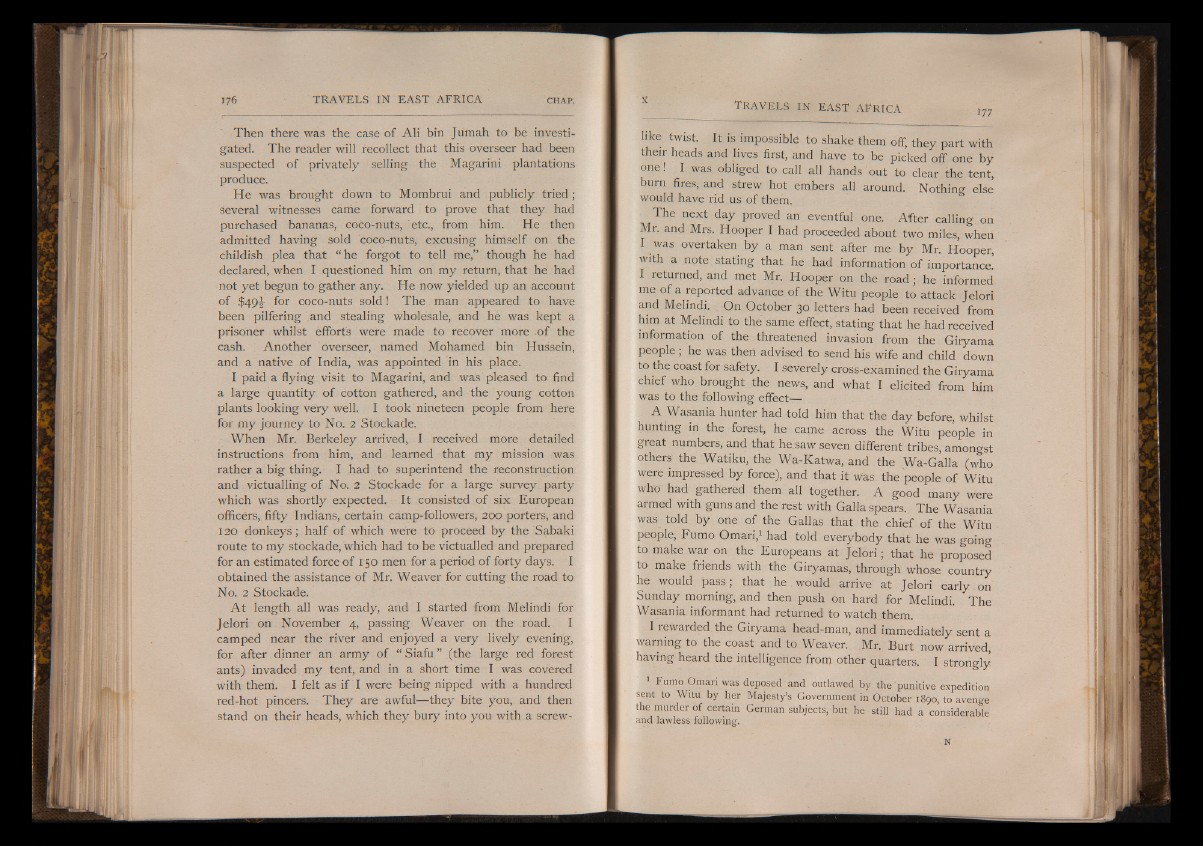
Then there was the case of Ali bin Jumah to be investigated.
The reader will recollect that this overseer had been
suspected of privately selling thè Magarini plantations
produce.
He was brought down to Mombrui and publicly tried ;
several witnesses came forward to prove that they had
purchased bananas, coco-nuts, etc., from him. He then
admitted having sold coco-nuts, excusing himself on the
childish plea that “ he forgot to tell me,” though he had
declared, when I questioned him on my return, that he had
not yet begun to gather any. He now yielded up an account
of $49^ for coco-nuts sold ! The man appeared to have
been pilfering and stealing wholesale, and hè was kept a
prisoner whilst efforts were made to recover more .of the
cash. Another overseer, named Mohamed bin Hussein,
and a native of India, was appointed in his place.
I paid a flying visit to Magarini, and was pleased to find
a large quantity of cotton gathered, and the young cotton
plants looking very well. I took nineteen pèople from here
for my journey to No. 2 Stockade.
When Mr. Berkeley arrived, I received more detailed
instructions from him, and learned that my mission was
rather a big thing. I had to superintend the reconstruction
and victualling of No. 2 Stockade for a large survey party
which was shortly expected. It consisted of six European
officers, fifty Indians, certain camp-followers, 200 porters, and
120 donkeys; half of which were to proceed by the Sabaki
route to my stockade, which had to be victualled and prepared
for an estimated force of 150 men for a period of forty days. I
obtained the assistance of Mr. Weaver for cutting the road to
No. 2 Stockade.
A t length all was ready, and I started from Melindi for
Jelori on November 4, passing Weaver on the road. I
camped near the river and enjoyed a very lively evening,
for after dinner an army of “ Siafu” (the large red forest
ants) invaded my tent, and in a short time I was covered
with them. I felt as if I were being nipped with a hundred
red-hot pincers. They are awful— they bite you, and then
stand on their heads, which they bury into you with a screwlike
twist. It is impossible to shake them off, they part with
their heads and lives first, and have to be picked off one by
one! I was obliged to call all hands out to clear the tent,
burn fires, and strew hot embers all around. Nothing else
would have rid us of them.
The next day proved an eventful one. After calling on
Mr. and Mrs. Hooper I had proceeded about two miles, when
I was overtaken by a man sent after me by Mr. Hooper,
with a note stating that he had information of importance.
I returned, and met Mr. Hooper on the road; he informed
me of a reported advance of the Witu people to attack Jelori
and Melindi. On October 30 letters had been received from
him at Melindi to the same effect, stating that he had received
information of the threatened invasion from the Giryama
people, he was then advised to send his wife and child down
to the coast for safety. I severely cross-examined the Giryama
chief who brought the news, and what I elicited from him
was to the following effect—
A Wasania hunter had told him that the day before, whilst
hunting in the forest, he came across the Witu people in
great numbers, and that he.saw seven different tribes, amongst
others' the Watiku, the Wa-Katwa, and the Wa-Galla (who
were impressed by force), and that it was the people of Witu
who had gathered them all together. A good many were
armed with guns and the rest with Galla spears. The Wasania
was told by one of the Gallas that the chief of the Witu
people, Fumo Omari,1 had told everybody that he was going
to make war on the Europeans at Jelori; that he proposed
to make friends with the Giryamas, through whose country
he would pass; that he would arrive at Jelori early on
Sunday morning, and then push on hard for Melindi. The
Wasania informant had returned to watch them.
I rewarded the Giryama head-man, and immediately sent a
warning to the coast and to Weaver. Mr. Burt now arrived,
having heard the intelligence from other quarters. I strongly
1 Fumo Omari was deposed and outlawed by the punitive expedition
sent to Witd by her Majesty’s Government in October 1890, to avenge
the murder of certain German subjects, but he still had a considerable
and lawless following.